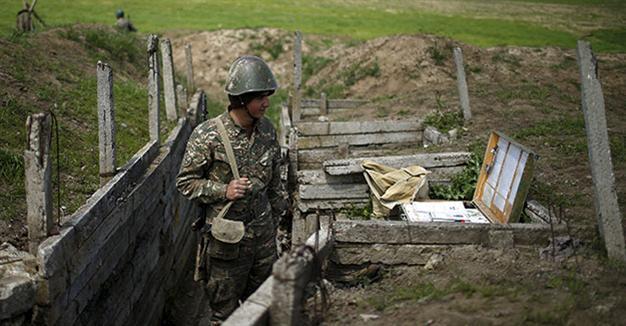Azeri-Armenian truce broken as 2 more killed
BAKU

An ethnic Armenian soldier stands guard in a trench at artillery positions near the Nagorno-Karabakh's town of Martuni, April 7, 2016 - Reuters photo
Two ethnic Armenian troops died in fighting with Azerbaijani forces April 8 as the foes accused each other of breaching a cease-fire that halted the worst outbreak of violence in decades over the disputed Nagorno-Karabakh region.
The latest clashes are the first serious violation of a Moscow-mediated cease-fire which took effect on April 5, ending several days of fighting over the Karabakh region that claimed at least 90 lives.
The unrest has sparked concern of a wider conflict in the strategic area that could drag in regional powers Russia and Turkey.
“Azerbaijan violated a cease-fire overnight” using mortars to shell ethnic Armenian rebel positions in Karabakh, the territory’s Defense Ministry said in a statement, adding that two soldiers were killed.
Armenia accused Azerbaijan of shelling both military and civilian targets on the border.
“The Armenian villages of Karmir, Ttudjur, and Baganis came under Azerbaijani fire,” ministry spokesman Artsrun Hovhannisyan said in a statement.
Azerbaijan, a mostly Muslim former Soviet republic, said it returned fire after Armenian forces shelled its positions in Karabakh.
“Azerbaijani armed forces responded to Armenian artillery strikes,” Defense Ministry spokesman Vagif Dargahly said. “Civilian targets [in Azerbaijan] were also shelled by the Armenian forces.”
Later in the day, Azerbaijan and Armenian-backed separatists said they had struck a temporary deal to allow each side to safely search for the bodies of their soldiers killed in clashes over Nagorno-Karabakh.
An official at the Armenian Defense Ministry used social media to post the names and photographs of 44 separatist soldiers who he said were killed in the clashes since April 2.
Russian Prime Minister Dmitry Medvedev was in Baku on April 8 to hold talks with İlham Aliyev, the Azerbaijani president, aimed at resuming diplomatic efforts to resolve the territorial dispute.
“Russia, no less than Azerbaijan and Armenia, has an interest in there being peace in this region, our region,” Medvedev said. “The cease-fire agreement is the foundation for unfreezing talks between Baku and Yerevan.”
Any progress toward a permanent settlement of the dispute is likely to be halting.
On April 7, Medvedev was in Yerevan to holds talks over a solution in the region.
Azerbaijan and Armenia fought a war over the mountainous territory, with a population of mostly ethnic Armenians, in the early 1990s, during which thousands were killed on both sides, and hundreds of thousands were displaced.
The region was seized by Armenian rebels from Azerbaijan in a war which ended with an inconclusive truce in 1994. The territory is now ruled by Armenia-backed separatist authorities who claim independence and are backed by Yerevan but are not recognized by any state.
Azerbaijan says the only outcome of negotiations it will accept is the restoration of its control over Nagorno-Karabakh and surrounding districts that are held by the separatists, while the Armenians say they will never agree to Nagorno-Karabakh being under Baku’s control.
